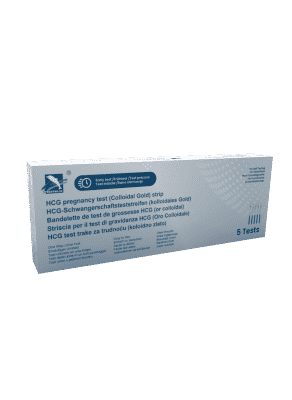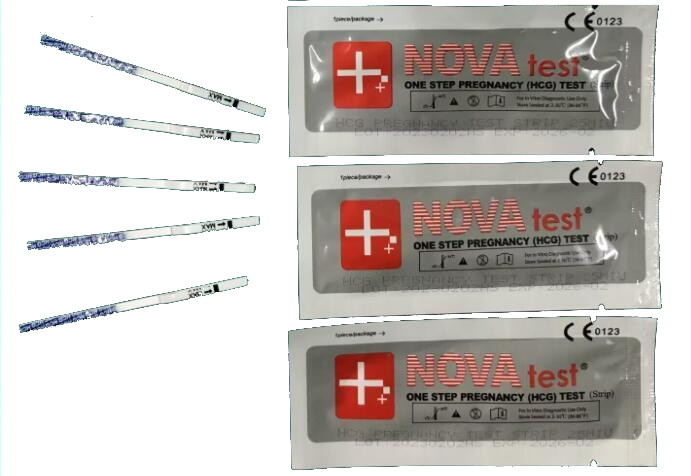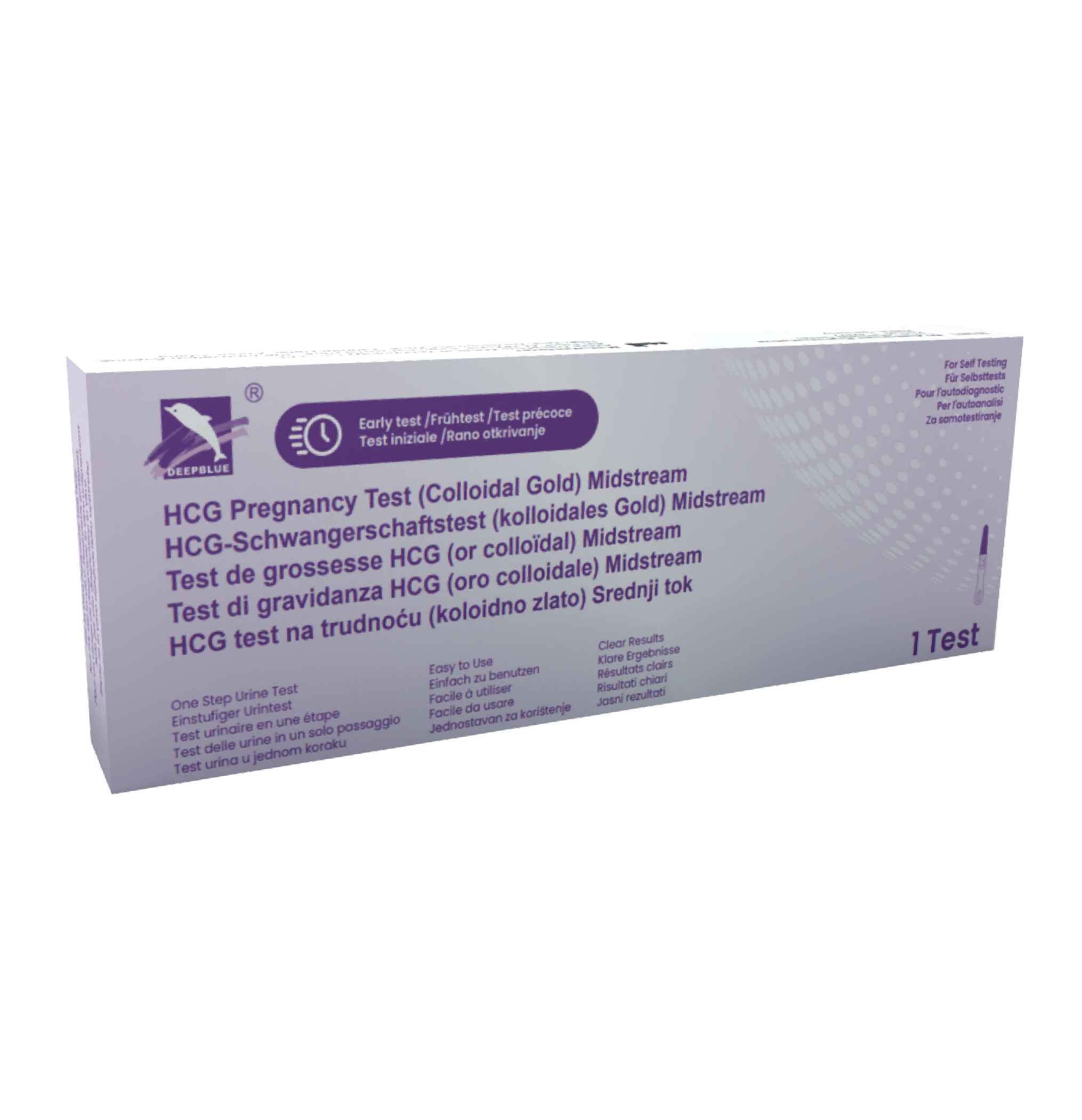Buy Pregnancy Tests
Our pregnancy tests at OdemShop provide quick and reliable results. They offer security and certainty during an exciting time for many.
Pregnancy Test: Know for sure if you are pregnant
It's an exciting and scary time when you want to find out if you're pregnant. Many women are unsure of where to start or what steps there are to ensure their results are reliable. In the modern world, there are many options for pregnancy test kits. Some tests offer simple results in just a few minutes. Others require more attention or specialized equipment.
In this article, we'll explain everything you need to know about pregnancy tests and what to look for so you can make the best decisions possible. We'll help you know for sure if you're pregnant!
Regardless of the type of test, always remember: the sooner you test, the more accurate the result - so you can finally have clarity!
What is a pregnancy test?
A pregnancy test is a procedure that women can use to determine if they are pregnant. There are several types of pregnancy tests, including urine and blood tests. All tests aim to detect the pregnancy hormone hCG (human chorionic gonadotropin), which is produced after a fertilized egg implants in the uterus.
Conventional pregnancy tests and digital pregnancy tests, such as the Clearblue Pregnancy Test Ultra Early Test Digital, are usually performed with morning urine, as this contains the highest concentration of hCG. If the test result is positive, pregnancy is very likely to have occurred. Even if the test result is negative and menstruation is absent, the test should be repeated after a few days to obtain a reliable test result.
In the event of a positive self-test, medical guidelines and the Federal Center for Health Education recommend a visit to the gynecologist. A blood test at the gynecologist can definitely confirm an existing pregnancy, as hCG can also be detected in the blood.
It is important to follow the instructions carefully when taking a pregnancy test and to pay attention to the storage instructions. This is because it is the only way to ensure the accuracy of the test. Home pregnancy tests offer the advantage of private and immediate use. They are usually reliable if done correctly and at the right time, usually from the first day of the missed period.
It should be noted, however, that the timing of hormonal medication use and conception can affect the test result. Therefore, it is important to consult a specialist in case of uncertainty and noticeable changes, such as hormonal changes or physical complaints. Test results may also be falsified if the pregnancy is advanced or if certain medications are being taken.
By and large, pregnancy tests offer women a quick and easy way to detect a possible pregnancy. But only a medical examination can definitely confirm a pregnancy.
What is the principle underlying the functioning of a pregnancy test?
Now that we understand what a pregnancy test is, let's learn more about how it works.
Pregnancy tests can be categorized into two types, one being urine tests and the other being blood tests. The most common test is the urine test because it can be done quickly and inexpensively. In most cases, the person needs to wake up in the morning to collect their urine before sending it to a lab or dropping it off at a pharmacy.
The blood test measures the level of HCG in the blood and thus checks directly for the hormone. This test provides a more accurate determination of pregnancy status than the urine test and is usually intended for later stages. With this test, you don't need to take any special precautions; it is enough to go to the hospital or doctor and draw your blood.
As soon as the egg is fertilized, your body starts to produce HCG - this is how you know for sure if you are pregnant or not.
What are the steps involved in performing a pregnancy test?
There are several ways to perform a pregnancy test. The simplest and most common method is the test with a pregnancy test strip, which you can buy in any pharmacy or drugstore.
To perform the test, you should first read the package insert of the test carefully. There it says how the test works exactly and which steps have to be carried out. As a rule, you have to dip the test strip into the urine or drip it directly onto the test strip using a pipette attachment.
Most pregnancy tests will show the result within three to five minutes. It is important to remain calm and not move the test while waiting, as this can skew the result.
If the test is positive, one should be examined by a doctor as soon as possible to confirm an existing pregnancy and to discuss possible further steps. If the test result is negative, the test should be repeated after a few days, as it is possible that the test was performed too early and the hormone hCG was not yet sufficiently detectable in the urine.
Overall, a pregnancy test is a simple and quick method to get certainty whether you are pregnant or not. It is important to consult a doctor or midwife if you have any uncertainties or questions.
What does a positive pregnancy test mean?
When a pregnancy test is positive, it indicates that the woman is pregnant. Although sometimes the result may not seem accurate, it is generally considered reliable and trustworthy.
A positive result usually indicates an absence of menstruation, which is considered a sign of pregnancy. However, testing HCG hormones in the body can cause people with high or irregular levels to feel similar to pregnancy - potentially leading to false positive tests.
For this reason, experts strongly recommend that those affected by the condition take further tests at their nearby healthcare facility. This will ensure that all doubts are removed and a reliable test result is obtained - whether positive or negative.
In other words, the best way to determine whether you are actually pregnant or not is to go to a healthcare professional. That way, professional tests provide an authoritative answer to the question, "Am I pregnant?"
What are some common indications of pregnancy?
It can be an emotional roller coaster to know for the first time if you are pregnant. However, there are certain signs and symptoms that can indicate pregnancy.
Dizziness, food cravings, increased discharge and hormonal changes are all indications that conception may have occurred. These signs usually appear within weeks of the egg being fertilized and it is possible to notice early signs of pregnancy depending on when conception occurred.
What are the different kinds of pregnancy tests that one can use?
There are a variety of pregnancy tests, including urine tests, blood tests, and ultrasound tests. Urine tests can be used to detect hormonal changes in the body during pregnancy. Blood tests are a safer way to determine if someone is pregnant. Ultrasound tests help monitor the baby's development during pregnancy.
Urine tests
Urine tests are one of the most popular types of pregnancy tests and offer women a quick and reliable way to find out if they are pregnant.
These tests use the detection of certain hormones in the urine to detect pregnancy - usually hCG.
They can be performed throughout the day and results usually show within a few minutes. Therefore, urine tests are among the most easily detectable types of pregnancy tests, as you have instant certainty and can take immediate action. Financially, this test is also very affordable, which makes it attractive to many couples.
Blood tests
Another test that should also be mentioned is the blood test. This type of pregnancy test uses the detection of specific hormones in the blood plasma, specifically human choriongonadotropin and beta-human choriongonadotropin (bHCG), to determine pregnancy.
Because this test is very sensitive, it can detect early signs of pregnancy - in some cases, even before you miss your period! The blood test provides more accuracy than the urine test and can also be used to track the baby's development.
However, you have to see a doctor for it and it is more expensive than a urine test. Thus, there are different options for each person depending on their preferences or needs. It's up to you to figure out which tests are best for you.
Ultrasound tests
Besides blood and urine tests, there is another way to confirm pregnancy: Ultrasound exams.
This type of exam uses sound waves to visualize the amniotic sac and other structures around the uterus. Although not as sensitive as a blood test or urine test, an ultrasound can help map details about your baby as well as the development of the mature placenta. It can also detect early abnormalities in the fetus - something that is not possible with any other test. Therefore, this type of testing is very helpful for medical professionals and parents alike.
So, one should consider using ultrasound as a part of pregnancy detection.
When does a pregnancy test provide reliable results?
It's like watching a thunderstorm hover in the distance, except that the answer to the question of life can be different for each individual. If you are wondering whether you are pregnant or not, a pregnancy test is the best option for clarity.
A monthly period possibly missed? There's no need to worry; it's all about your health and well-being. With a pregnancy test, you can find out if everything is okay or if there is cause for concern. Although tests have varying degrees of accuracy - both in terms of timing and their test result - a medically approved pregnancy test can usually tell you right away whether you are pregnant or not.
LH level is highest in the middle of the menstrual cycle
A woman's LH level rises about 12 to 36 hours before ovulation; therefore, tests are most accurate during this time. In most cases, fertilization occurs 24 to 48 hours after ovulation.
After implantation of the fertilized egg in the endometrium, the woman's body begins to produce the hormone HCG in the blood and specific immobilized antibodies against HCG gradually develop. Therefore, pregnancy tests can give positive results from about 7 - 10 days after the absence of the period.
How accurate are self-performed pregnancy tests?
Because there are so many different tests that people can use to find out if they are pregnant or not, experts still strongly recommend that women discuss their results with a doctor - especially if the test results are negative - to make sure that no further steps need to be taken.
This conversation allows everyone involved to better understand what the test result means and what action should be taken afterwards. Therefore, it is important to know at what point one could conceive in order to better interpret appropriate symptoms.
Conclusion
It is important to understand that a pregnancy test is a very serious thing and therefore you have to be careful with it. It can be difficult to interpret the results of the test correctly, but it is definitely worth having all the information about the test at hand. Also, you should always keep in mind that false positives can occur and complications can arise.
Ultimately, it is up to you as a woman in terms of deciding whether or not to take a pregnancy test - stay informed and weigh it well!
Related categories:
Where can you buy a pregnancy test wholesale?
Pregnancy tests can be purchased wholesale from many different stores and online stores. A great place to buy pregnancy tests wholesale is our online store OdemShop.
At OdemShop you can buy pregnancy tests in bulk at great prices. The store offers different brands and types of tests to make sure you find what you need.
Furthermore, OdemShop also offers top-notch customer service and easy ordering and delivery. Orders are processed safely and securely, and you can be sure that your products will be delivered quickly and on time.
Overall, OdemShop offers a convenient and reliable way to buy wholesale pregnancy tests, with a high-quality range of products, top-notch customer service, and safe and reliable delivery options.
FAQ's
Can a pregnancy test be false positive?
Yes, a pregnancy test can be false-positive. A false positive result means that the test indicates that the person is pregnant when they are not. There are several reasons for such misinterpretations and it is worth understanding why this happens. In most cases, women get false-positive test results due to hormones in the body other than Human Chorionic Gonadotropin (HCG), which can cause unexpected and sometimes misleading results.
Can a pregnancy test be falsely negative?
Yes, it is possible for a pregnancy test to be false negative, meaning that it indicates that you are not pregnant even though you are. This can occur due to testing too early or not having enough hCG in your urine or blood.
Can pregnancy test results be falsified?
Although it is entirely possible for tests to fail or be false positives, you should make sure that the test is used cleanly and correctly. If possible, take more than one test - preferably on different days - to make sure your results are accurate and trustworthy.
Is it possible to take a pregnancy test without a doctor?
Yes, it is possible to take a pregnancy test without a doctor. There are many available tests on the market that you can buy and do at home. These are usually very accurate and allow you to be certain of your pregnancy status as a result. It is essential to carefully follow the instructions of the specific test to ensure accurate results.
What is the principle behind the functioning of a pregnancy test?
A pregnancy test detects the presence of the pregnancy hormone hCG in a woman's urine or blood. Once a fertilized egg has implanted in the uterus, the body produces the hormone necessary for pregnancy tests to detect.
How safe are pregnancy tests?
Modern pregnancy tests are very safe, especially when used from the time of expected menstruation. Most tests have an accuracy of over 99%.
What is the ideal timing for taking a pregnancy test?
The best time to perform a pregnancy test is on the day of expected menstruation or after. However, some tests can be used earlier if you choose a sensitive test.
How long does it take for a pregnancy test to give results?
Most pregnancy tests provide results within a few minutes. However, some tests may take longer and may require you to check the result after a certain amount of time.
Can you take a pregnancy test more than once?
Yes, you can take a pregnancy test more than once if you are unsure or if you want to test again after a few days to make sure the result is correct.
Is it possible to do a pregnancy test while taking contraceptives?
Yes, it is possible to perform a pregnancy test while taking contraceptives. The use of contraceptives does not affect the result of the test.




